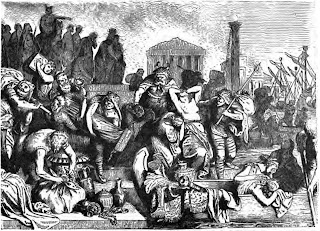
The world of In the Mother's Land is ours, several centuries down the line. After the collapse of our society, for reasons never clearly stated, surviving elites have retreated into high-tech refuge cities where they have slowly gone extinct while the outside fell into chaos – those events are described in Vonarburg's debut novel The Silent City. This chaotic situation did not last, however, and a new society has built itself upon the ruins of the old one.
Due to global warming large areas have been lost to the sea, and most of
 The warlord states and survivalist communities which formed the background of The Silent City have coalesced into ferociously patriarchal kingdoms: the Harems. Run by a tiny all-male elite lording over an enslaved female majority, they finally fall to a revolutionary wave triggered by the coming of a messiah-like figure – Garde – but led by a covert revolutionary movement dating back to the failed revolt described in The Silent City.
The warlord states and survivalist communities which formed the background of The Silent City have coalesced into ferociously patriarchal kingdoms: the Harems. Run by a tiny all-male elite lording over an enslaved female majority, they finally fall to a revolutionary wave triggered by the coming of a messiah-like figure – Garde – but led by a covert revolutionary movement dating back to the failed revolt described in The Silent City.
Like most revolutions, this one did not exactly bring peace and freedom. While the deposed kings fled north to their stronghold of Wardenberg, the victorious revolutionaries turned their kingdoms into queendoms, every bit as tyrannical and warlike as their predecessors: the Hives. Yet it is from these hives that the world of In the Mother's Land evolved after another revolution, relatively peaceful this time.
The world in which Vonarburg's heroine Lisbeï is born is hardly an utopia, but it is a working society. It is a loose confederation of provinces, themselves loose confederations of autonomous city-states: the Capteries. Those relatively small communities are ruled by hereditary captes who represent them at the provincial assemblies. They share a common history and culture but are diverse in language and ideology, ranging from hardline fundamentalists – the Judites – to progressives.
The Mother's Land is beset by problems caused by resource scarcity and gender imbalance. Most children die young from a mysterious genetic disease. Research and recuperation of scrap metal and devices left over by our civilization is a major industry, and indeed the heroine's job. Yet The Mother's Land's knowledge of its own past is extremely limited. All that remains of our time, aside from a few miraculously recovered texts and artifact, are heavily distorted fairy tales – including Ys – and barely recognizable cultural items. In fact, The Mother's Land barely cares about what is for it a distant and irrelevant past; and of Lisbeï’s discoveries, the one which causes the most turmoil is about the much more recent and more important fall of the harems.
The real ecotechnic societies which will emerge out of the ruins of our time will, of course, bear little resemblance with the carefully crafted Mother's Land, but this does not mean that it has nothing to teach us.
Its first lesson is that real ecotechnic societies will be very different from our societies. They may not share our hopes and values. They may even consider them abhorrent or, even worse, irrelevant. They will be, of course, our children, and their societies will have been shaped by the decisions we make now; but those decisions, and the spirit in which they will have been made will have long forgotten. It is not only somewhat vain to try to impose our ideologies upon a distant future, it is futile.
When we make a choice about what we want to preserve and transmit – or not transmit – we must remember our descendants may have a very different agenda. We all know that a large part of Greco-Roman culture was lost during the Dark Ages, but what we often fail to realize was that this loss was in fact a choice. Faced with very limited resources, early medieval monks chose to preserve Justin Martyr's apologies rather than Claudius' Etruscan grammar. We may disagree with this choice – I certainly do – but we can rest assured that our descendants will make similar ones.
The second lesson is that future societies will be as fluid as ours. We often see traditional societies as immobile, set in their ways, and without a history. The truth is that they often claim to be so, because they draw their legitimacy from tradition. That is what led Saxon kings to engineer convoluted genealogies going up to Woden Himself, or Chinese historian to grant imperial legitimacy to the most unlikely claimants so that subsequent dynasties might have somebody from whom to be bequeathed the Mandate of Heaven.
Real societies do change and the same way Vonarburg's Harems became Hives, then Capteries, which, in turn will undergo a number of change over the course of the novel, so future societies will continuously evolve new languages, philosophies and religions. Even after the tragedy of collapse is played out and something of a stable way of life is achieved again, countries and people will continue to compete for scarce resource and civilizations will develop new ways of inventing themselves until mankind itself fades out and goes extinct. That means that there is no point in trying to bring out any kind of heaven on Earth, not only because such an endeavor generally results in a very convincing hell, but also because societies never stay put and even a successful utopia is bound to eventually evolve into something else.
There is no timeless Republic, no






